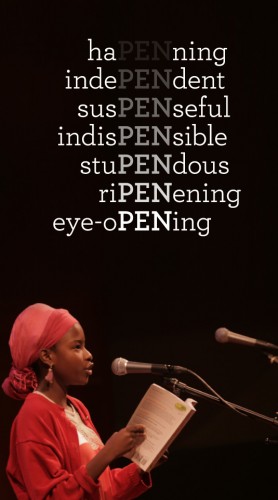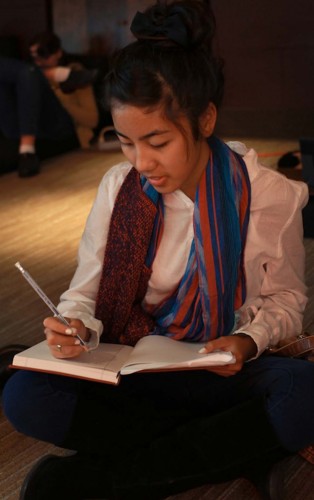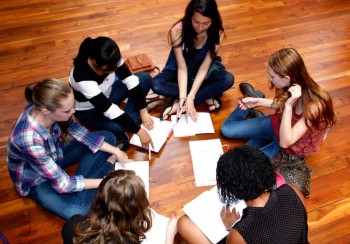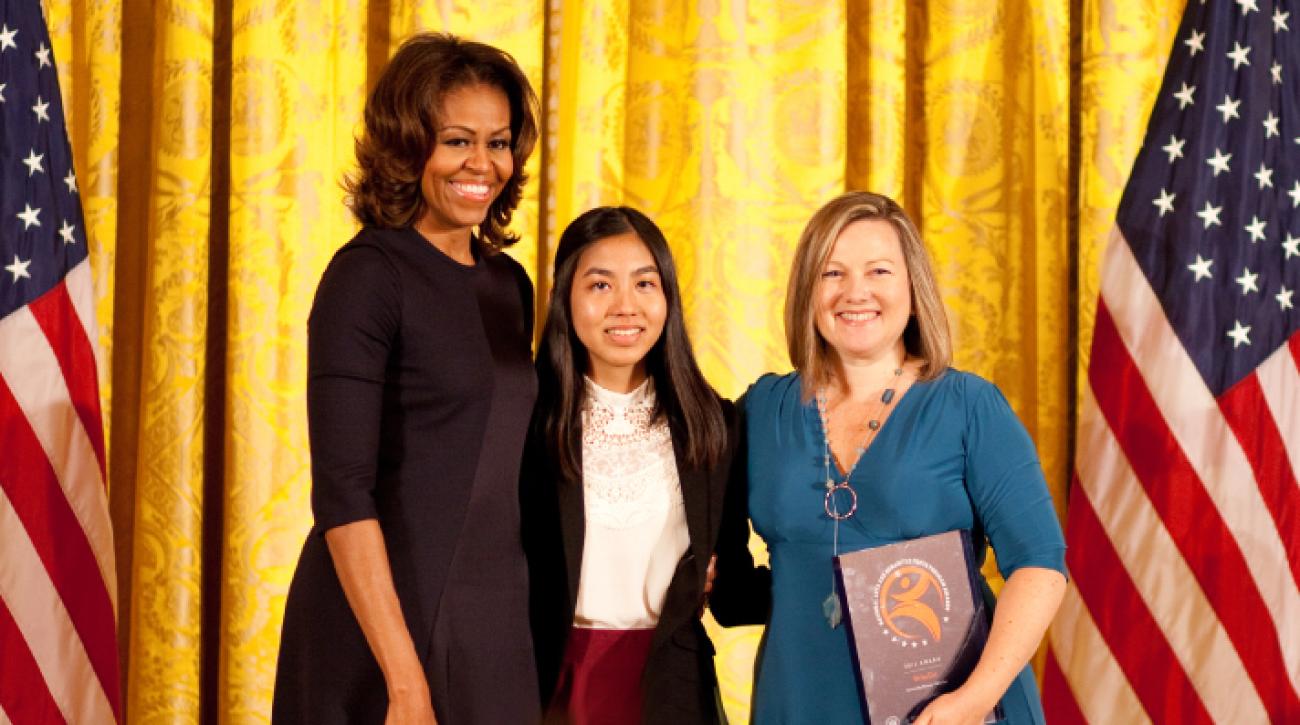Writes of Passage
 Never underestimate the power of a girl and her pen. A surprising declaration in this electronic age where pen and paper rarely meet. But if you’re a creative teenage girl from an inner‑city school in Los Angeles you would probably recognize the rallying call of WriteGirl, the brainchild of UBC alumna Keren Taylor, BA’86.
Never underestimate the power of a girl and her pen. A surprising declaration in this electronic age where pen and paper rarely meet. But if you’re a creative teenage girl from an inner‑city school in Los Angeles you would probably recognize the rallying call of WriteGirl, the brainchild of UBC alumna Keren Taylor, BA’86.
Founded by Taylor in 2001, WriteGirl has a simple premise: pair professional women writers with teen girls for weekly one‑on‑one mentoring and writing workshops and watch the transformation that happens.
“These girls have tremendous challenges – depression, abuse at home, pregnancy, bullying – very serious issues,” says Taylor, executive director of the organization. “They look like they’ve got it all together but nobody is paying attention to their inner life. This environment gives them space and time to think about who they want to be.”
Currently, there are 350 at‑risk girls aged 13‑18 from 60 LA high schools participating in WriteGirl. About 150 of them are in the Core Program, which provides customized mentoring, genre‑specific workshops, and support for college and scholarship applications. Girls are recruited with the aid of school counsellors and teachers and are able to stay in the program right through high school. Additionally, an In‑Schools Program sees mentors leading weekly group workshops to improve literacy and communication skills for girls in underserved neighbourhoods and detention centres.
Women journalists, screenwriters, poets, grant‑writers, novelists, corporate scribes and others form a volunteer network dedicated to nurturing the young writers’ self‑expression and self‑confidence. With communication skills to open doors, the goal is to help girls believe in themselves. Women talk about how enriching and moving their mentoring relationships are – they say they can see the women these girls are becoming.
Mentors meet students in a coffee shop or library for one hour a week, participate in behind‑the‑scenes planning work and commit to attending monthly workshops held in partner venues such as the Grammy Museum and the Los Angeles Times headquarters. With an emphasis on acceptance, expression and fun, the writing and critical thinking workshops are designed to be completely unlike school – no judgment, no tests and no restrictions.
“These girls have tremendous challenges – depression, abuse at home, pregnancy, bullying – very serious issues. They look like they’ve got it all together but nobody is paying attention to their inner life.”
Amanda Gorman and her mentor are editing the first draft of a novel the 16‑year‑old has been writing over the last two years. Gorman says one of the toughest parts of being a writer is finding the courage to put forward your ideas and wear your heart on your sleeve. “You’re literally an open book,” she says. But her WriteGirl experience has allowed her to trust herself and has given her hope.
“Being a teenager, you’re so distraught with pressure,” she says. “There aren’t enough strong female advocates out there and writing isn’t usually suggested as a legitimate occupation. But WriteGirl shows you there is more world to explore with a pen in your hand than without one. But your pen isn’t the power – you are the power.”
Gorman, who also writes poetry, aspires to be a human rights advocate. She thinks if more schools were like WriteGirl, students would be stronger, more confident and have a passion to contribute positive solutions to the world.
Taylor’s own passion for WriteGirl is yielding impressive results.
Not only does the organization publish award-winning annual anthologies of student work, but since its inception WriteGirl has guided every one of the 500 teens in the Core Program to finish high school and enroll in college. In a city of high‑density schools, few counsellors, and dropout rates of around 50 per cent for metropolitan schools, WriteGirl’s success has attracted well‑deserved attention.
In 2013, the organization was one of 12 awardees chosen from 350 nominations to earn a National Arts and Humanities Youth Program Award. Taylor and WriteGirl mentee Jacqueline Uy – an aspiring journalist – received the award from First Lady Michelle Obama at a White House recognition ceremony. The organization received $10,000 and a year of communications and other support.
Taylor was also recently named a CNN Hero for her work with WriteGirl, part of the broadcaster’s campaign to honour “everyday people changing the world.”
“We want to give these girls tools that enable them to be positive and thrive and rise above whatever challenges they may be facing,” says Taylor.
 She didn’t set out to create a support organization for teen girls. With an undergraduate degree in International Relations, she originally saw a future in the Foreign Service. But after taking a look around and realizing the service was very male‑dominated with nary a female mentor in sight, she had to re‑think her ambitions.
She didn’t set out to create a support organization for teen girls. With an undergraduate degree in International Relations, she originally saw a future in the Foreign Service. But after taking a look around and realizing the service was very male‑dominated with nary a female mentor in sight, she had to re‑think her ambitions.
“I didn’t want to fight the fight to get myself and other women into positions of leadership,” she says.
So she drew on other talents. In addition to her UBC degree, Taylor holds a Piano Performance Degree from the Royal Conservatory of Music in Toronto and a Diploma from the American Music and Dramatic Academy in New York City. During her 15 years in New York, she worked in musical theatre and also held song‑ writing and poetry workshops in city high schools. That’s where she had her Eureka moment. Taylor saw that students who were struggling with life at school and at home changed in the workshops – they found confidence and joy in creative expression.
That was familiar territory for someone who as a girl read hundreds of books every year and took classes in many forms of artistic interpretation. As a high school student Taylor had realized how few books were written by women or had interesting female characters. She became convinced of the importance of female voices being heard.
It was a few more years, including a stint as a performer in Las Vegas, before Taylor found herself in Los Angeles with an opportunity to revisit the idea of creative writing workshops for youth. Terminated from an advertising sales job, she used her severance pay to start WriteGirl and welcomed 13 girls to the first meeting.
“It’s ironic that the journey I didn’t want to take as a graduate is now exactly the journey I am taking,” says the 50 year‑old. “Creating empowerment for women is something I am emotionally compelled to do something about.”
With an emphasis on acceptance, expression and fun, the writing and critical thinking workshops are designed to be completely unlike school – no judgment, no tests and no restrictions.
There have been some changes in the past 13 years, including greater access to computers. However, Taylor remains a fan of pen and paper and believes the act of writing in a journal allows for more freedom of expression than writing on a screen. But most importantly, the same conditions persist for students from low‑income families, producing “an endless stream of girls in need.”
This summer Taylor will be involved in a creative writing pilot program for boys who are incarcerated. She’s also thinking about doing more work globally, having Los Angeles girls connect with teen writers in Africa and India in what might be “an old‑fashioned pen pal conversation.”
 WriteGirl alumnae are all over the world, staying in touch via a Facebook page, and two “grads” have come back to serve as mentors. Even with such success, WriteGirl faces the challenges of maintaining a supply of mentors; retaining and renewing a network of supporters; and attracting funding to secure the organization’s future.
WriteGirl alumnae are all over the world, staying in touch via a Facebook page, and two “grads” have come back to serve as mentors. Even with such success, WriteGirl faces the challenges of maintaining a supply of mentors; retaining and renewing a network of supporters; and attracting funding to secure the organization’s future.
That all takes a lot of energy. Fortunately Taylor is able to recharge through her own creative expression, which includes poetry, songwriting, singing with a band, jewellery‑making and mosaic art.
“I’m so glad to be able to do this work,” she says. “These girls strike a chord inside me – they are unstoppable.”
For more information on WriteGirl visit www.writegirl.org
All photos courtesy of WriteGirl
My Name
by Amanda Gorman, Age 16
I am Amanda Gorman
the pun standing, dependent, on the comical guilt of my last name.
I am Amanda Gorman,
even though I am not A MAN at all,
nor am I a gory man.
I am Amanda Gorman
I always thought my name had a perpetual amount of a’s
blazing bright orange and shoving out the “d” like stones thrust from my lips
Or corncake dug violently from my teeth
It is the predictable weather, a storm inevitably followed by a rainbow,
my name followed by Gabrielle, my twin sister’s name,
always
Amanda is the name of a character my mother created with love
in a book she wrote and tucked carefully into binders
A name of a relative
with immeasurable significance to my mother
But just familiarity to me
Amanda is a cloak, wrapping me with its dominating vowels
shrouding me from
vulnerability and exposing me to my strength
The yellow brightness of Amanda Banana
because I was born yellow
Or Amanda Panda
because I was also born very small,
like a baby panda
Or perhaps my true name is my middle name
a verb, an emblem, imprinted on my working hands,
coating my voice
like bitter frosting with the pretext of sweetness
Chase.
Yes, Chase, that’s the name
Perhaps one day instead of Chase I will be Found
I will chase my dreams and hopefully find them as well
But for yesterday, today, and tomorrow, I will be Amanda
And I realize that Amanda
is more than good enough.

































